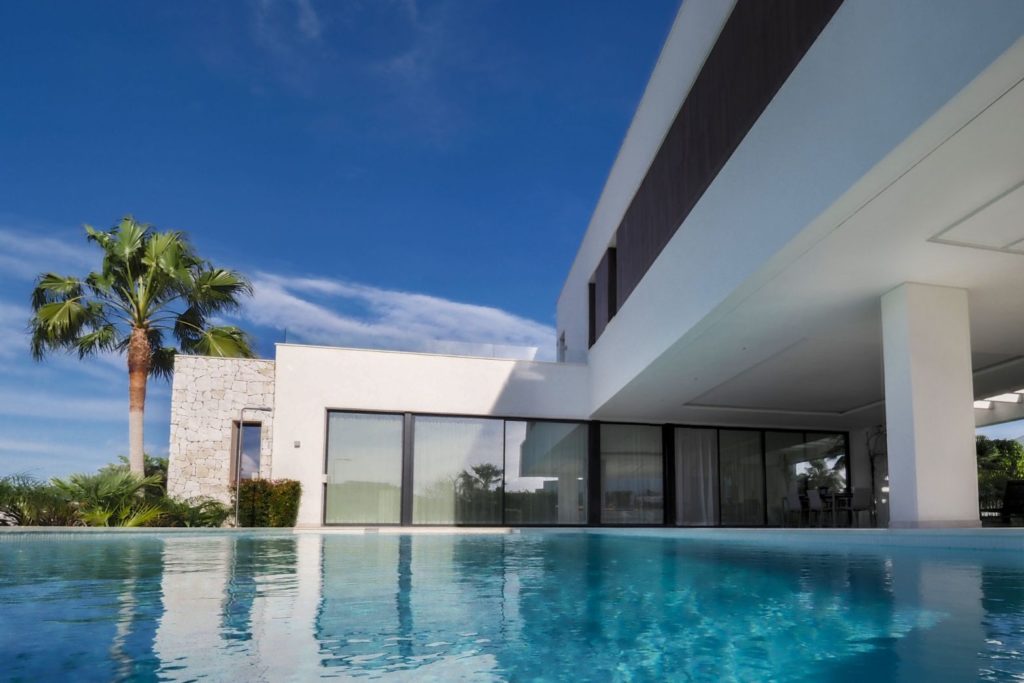What is the Municipal Added Value Tax (PlusValía) in Spain?
The Plusvalía is a local gain tax charged by the municipality when the property is sold. It is normally paid by the vendor unless other agreement is made between the seller and buyer.
It is based on the increase of value of the land and the years that has passed since the property was bought. Usually, it is not a significant amount for apartments and townhouses, however, it should be considered before selling the property.
Find more details about how to pay and calculate the plusvalia in our blog.
Are there any other Expenses when buying a property?
Yes, for any purchase and sale of a property, it is necessary to go to a notary’s office to sign the Deed. The cost can vary from €600 to 1000€, depending on complexity of the transaction.
The next step is registering the property in the Land Registry. This expense is related with the price of the property. It might vary from 300€ to 2000€
See all the detailed expenses of buying a property.
Property purchase costs
Whether you purchase a brand new property or a resale home, you must pay VAT or ITP. The VAT for new properties is 10% – except for Land plots. The Transfer Tax or “ITP” is scaled from 8% to 10% according to the property value.
You can read more information about how to estimate the ITP tax in our blog post.
The AJD or Tax on Documented Legal Acts, must be paid along with the VAT when buying a new property.
In Andalucia the AJD tax is 1.5% of the price of the property.
Are there good private Schools in Costa del sol?
Yes, some of the best private schools of Spain are in the Costa del Sol. Most of schools are bilingual with English and Spanish as their main languages, however there are many good options with different languages as French, German or even Swedish.
Most of them offer extensive extracurricular activities as well as different curriculum options as G.C.S.E.s and A-Levels, and the International Baccalaureate.
For further information visit our post “The Best Private Schools in Marbella and Costa del Sol”
What are the legal procedures and costs when buying a property in Spain?
Whilst buying a property in Spain is relatively easy and simple, you should always appoint a qualified solicitor to represent you as well as a certified financial advisor who can help handling your tax queries.
In terms of process, once an offer is made and the seller’s paperwork including property register is checked by the solicitor, a private contract of purchase is signed between the two parties and a non-refundable deposit (usually 10% of the agreed purchase price) is paid. This contract will contain key information on the purchase such as the legal description of the property, acquisition price, form of payment, date of completion and possession, etc.
Most purchases will complete within 30 to 60 days.
When the sell completes, the seller will issue a public deed of conveyance (escritura) to the purchaser, free of liens and impediments and the remainder sale price is paid by the buyer. The deed is issued by a certified Spanish Notary, and then sent to the tax office to determine which tax is liable for payment. This could be transfer tax (ITP) if the property is being sold by an existing owner or stamp duty (AJD) if the property is sold directly by the developer. Subsequently the deed is sent to the Property Registry for registration.
Properties which are bought while construction works are still ongoing are paid ahead of completion with these payments being guaranteed by law, through a bank or insurance company. This means that if a properties’ completion is delayed, the buyer can recoup the money paid as well as legal interests. In addition, any developer is also obliged by law to provide the buyer with a 10-year insurance policy against building defects.
Do I need to pay Capital Gains Tax and Retention?
As non-resident, you will need to pay Capital Gains Tax on the sale of properties. This is currently set at 19% and applicable to the profit earned through the sale.
The profit is calculated on property value when it was sold (minus costs) minus the property value (minus costs) when it was bought and is based on the annual percentage increase on the base value set by law.
Furthermore, a 3% retention on the sale price applied to all non-resident sellers. This is paid to the Tax Office directly by the buyer on behalf of the seller and involves submitting a 211 form.
The buyer collects the 3% payment from the seller as a payment on account of tax due on the income resulting from this sell. The buyer will handover to the seller a copy of the 211 form which states the retention value. This will be used as evidence to be used by the seller, stating the amount which can be deducted from his own tax return. If the amount retained exceeds the tax that is due, a refund may be applicable.
What about income tax? I am liable?
It depends if you are considered a fiscal resident or not and on the type of income. For tax purposes, you will be considered a fiscal resident in Spain if you reside in Spain over 183 days per calendar year, and your main interests such as economic or family ones are also in Spain. If you are in this category, you will need to declare and pay tax for all your incomes in Spain even if it is earned in another country.
If you are not a fiscal resident in Spain, you will still need to pay income tax if you receive income through a property you own in Spain.
There are two forms of taxation applicable depending on the source. If you rent your property, you will be subject to a 24% tax on that income but if you are a fiscal resident in the European Union, Iceland and Norway, the rate applicable is 19% and you are also allowed to deduct expenses related to the rental).
There is also a tax applicable to the derived benefit on own use of property. This is set at 24% of 1,1% of the rateable value of the property (if the rateable value has been revised or modified and has been entered into force during the taxable period or in the previous ten taxable periods), otherwise, the applicable rates will be: 24% of 2% of the rateable value of the property) with the exception if you are a fiscal resident in any countries within the European Union, Iceland and Norway, in which case the rate applicable is 19%.
Wealth Tax in Spain, do I have to pay it?
There is indeed a wealth tax in Spain; this was reinstated by Royal Decree (13/2011) in 2011 and has been in use since then. This tax applies to any fiscal resident and all their net worldwide assets are liable, whereas non-residents are only liable for tax on net assets located on Spanish territory or taxable in Spain.
In 2021, although the state budget increased the top rate of wealth tax from 2.5% to 3.5%, this only applies where the local autonomous community does not apply its own rates – which Andalucía does. Andalucía´s top rate is actually only 2.5% in 2021, so wealthy residents are actually better off when compared with the rest of Spain.
Each taxpayer (whether resident or non-resident) has a €700,000 deductible allowance. Additionally, each taxpayer may deduct up to €300,000 in respect of the habitual residence but only if resident. The Net taxable wealth is then subject to tax on an ad-valoram applied and adapted by each Autonomous Community.
What other taxes will I be liable for as Non-Resident in Spain?
– Municipal Added Value Tax (PlusValía)
– Rates or Annual Property Tax (IBI)
– Rubbish Tax (Basura)
– Wealth Tax (Impuesto de Patrimonio)
– Income Tax (Impuesto sobre la Renta)
– Capital Gains Tax (Impuesto sobre Ganancias Patrimoniales Inmobiliarias) and Retentions
Other costs
Cleaning services are usually available either full-time or on an hourly basis. For example, someone working full-time would usually receive a salary of around €850 per month as well as an added 40% of the salary which will go towards social security contributions. For someone coming to work on an hourly basis you can expect to pay somewhere between €10 to €15 per hour.
Electricity costs can vary depending on air conditioning usage and are usually billed monthly or bimonthly. A minimum charge is applicable to all contracts and it varies depending on the properties’ size. The usual minimum charge for an apartment is between €40 and €75 per month and for a house it’s about €100 to €150 per month. A standard usage is €0.08 per Kwh plus tax. All rates are exclusive of taxes.
If your property comes with a garden it will be essential that it is maintained, especially during the dry summer months. The costs will depend on size and type of planting, and for example a medium size property might need a gardener for a couple of hours a week whilst a large one might need someone full-time. As a rough guide, the going hourly rate for gardeners is around €16 and a full-time gardener will cost around €1.100 per month. If on the other hand your property comes with a communal garden the cost will be included in your management fee.
If your property forms part of an Homeowners’ Association, this legal entity will own and maintain the shared elements of the building or estate in question, and you will pay a monthly management fee to contribute towards these costs. Usually, each management fee is determined by the size of the apartment, or plot, divided by the total area of all the apartments or plots.
There are annual general meetings which will approve and set an annual budget via a vote. Expenses can include items such as common garden or lift maintenance, repairs to common elements such as roofs, rubbish collection, water for watering community gardens, electricity for lighting communal areas, insurance, security, and administration fees.
If your property is an individual villa the management fee will be limited to road and kerbside garden maintenance, basic common service maintenance, and security.
The rubbish collection rate is set by the Town Hall according to the property’s size and location and is due every 6 months. For an apartment in Marbella rubbish collection is approximately €180 and a villa approximately €300 per year.
Water consumption is measured by a water meter installed in every property and is payable every 3 months. Payment can be made by bank with direct debit instructions.
The insurance cost depends on whether your property is a standalone villa or part of an apartment block. If the latter, the Homeowners’ Association is liable for to insuring the reproduction cost of the building. As such your insurance policy for the apartment doesn’t have to cover the entire value of the apartment, but only damages to the interior of the apartment, its contents, and third-party liability. It is also prudent to insure the building at first risk in case the Homeowners’ Association´s is not comprehensive enough. If the former, your insurance policy will have to be a comprehensive one.
I really want to build my own house. Is this possible?
It depends on the plot and due diligence must be undertaken to determine this before the purchase goes ahead. As a rule of thumb, if the plot is located within an existing settlement or an area zoned as housing in the Municipal Plan, there is an outline consent the construction of a detached home. You will need to take building regulations into account, and these may affect the plot to build size ratio.
How good are the medical and health insurance facilities in Spain?
The Hospital Costa del Sol is one of the best and newest regional hospitals in Spain and there are also several smaller practices with a range of general practitioners and specialists as well as other private Hospitals nearby as Quiron, Clinica Ochoa or Marbella Highcare.
Private medical insurance is available through several providers. Its cost usually ranges from €30 to €130 per person per month, depending on their age and other factors such as pre-existing medical conditions etc. EU residents have access to the E-101 card which provides free of charge medical care. If you are a resident and pay social contributions, you are automatically entitled to access to the Spanish health network.
Can I get a mortgage in Spain?
If you are a foreign applicant, depending on your monthly outgoings and existing commitments, you could potentially get a mortgage loan to be approved for between 50% and 70% of the official valuation price of the property. You will need to appoint an agent and solicitor and the whole procedure can take anywhere from three weeks to almost two months from the time all the documentation is submitted.
The standard documentation required by the Spanish banks (English is acceptable for most applications, otherwise it will need translating) includes:
– Two years’ tax returns
– If you are employed you will need the last 6 months payslips, as well as proof of any other regular income. If you are a company owner, you will need to supply the proof of your various means of income
– A list of your current monthly mortgage payments (if you have any)
– A statement of one’s total assets and liabilities, confirmed by a professional accountant
– Copies of one year’s bank account statements
– Copies of your passport
– Application form
– Additional documentation might be required, depending on the case
How long can I stay in Spain for as a Non-Resident?
Since the Brexit transition period ended, British passport holders travelling to the EU, Iceland, Norway and Switzerland have been subject to the EU rules of entry and stay for third-country citizens – including to the rule that permits non-EU citizens and residents to stay in the Schengen territory for a maximum of 90 days in any 180-days period. This will apply to your stay in Spain. If you wish to stay longer, you should check the immigration rules and then apply for the proper visa/residence permit according to your purpose of stay.
Any member from an EU country can stay in Spain indefinitely. Visas are not required for some other countries such as the United States, but are still required in other cases, depending on one’s country of origin, and with varying lengths of stay permitted.
Please note that any non-resident residing in Spain 183 days or more per calendar year is considered by the Tax Office to be a resident for tax purposes.
Can I commission a building survey on my property?
A building survey is not a legal requirement before buying a property and securing a mortgage. However, you might want to consider one when purchasing an older or non-standard property.
A survey will usually check the condition of the plumbing and electrical installations, walls and roofing. A qualified Architect (aparejador) or British Chartered Surveyor will be able to undertake a survey, the cost of which is payable by the buyer.








